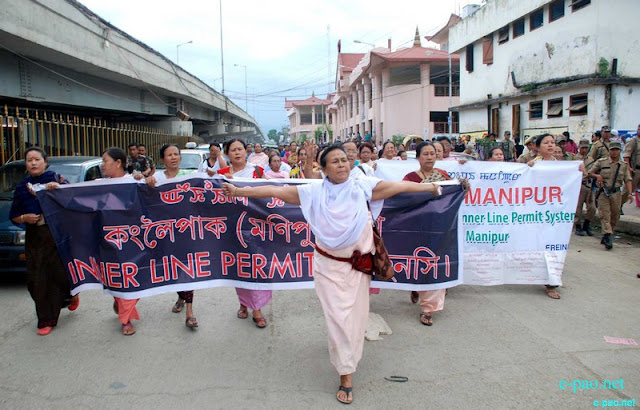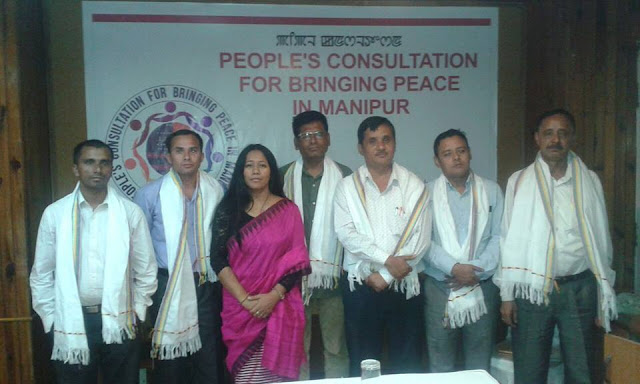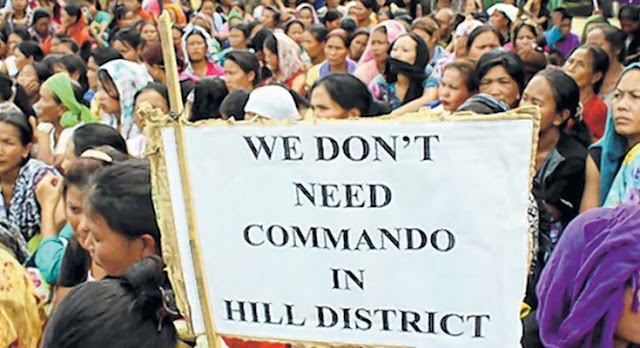PRESS RELEASE: Manipur Gorkha Society, Delhi
MANIPUR GORKHAS CHANT PEACE AT PEOPLE'S CONVENTION, DELHI
11th June, 2016: A delegation of Manipur Gorkha Society, Delhi attended the trust building day-long People’s Convention for A United Manipur People's Forum for Hills and Valley Peace and Reconciliation Dialogue at the Deputy Speakers Hall, Constitution Club, New Delhi today.
Concerned citizens and eminent personalities from Manipur and outside including Harsh Mander, Director of the centre for Equity studies, Dr Anuradha Chenoy, Dean, JNU SIS, Mr David Boyes, Founder-Member, Northeast India Forum Against Racism, Dr Alana Golmei, General Secretary, Northeast Support Centre & helpline, Mrs Rose Mangshi Haokip, President, Kuki Women's Union, Mrs Sitara Begum, Muslim Woman Leader, Mr Lakpachui Siro, Co-founder of FUNICH (Forum for understanding the Naga-India conflict and human rights), Mr Babloo Loitongbam, Director, Human Rights Alert, Ms Lianboi Vaiphei, IP College, Delhi (TBC), Mrs Lucy Jajo, Conflict Widow, Ukhrul, Manipur, Mr Amit Luwang, Mr Jenil, Social Warriors, Mr Ghanashyam Moirangcha, Mr Nido Patra, Arunachal Pradesh, different student leaders.
 |
| Representatives of the Manipur Gorkha community Rajen Chhetry |
The convention was initiated by a team of social activists and volunteers including Ms Binalakshmi Nepram, Founder, Manipur Women Gun Survivors Network/Northeast India women initiative for peace.
In a full-day discussion, various speakers cutting across ethnic tribes and communities, discussed on various aspects of the ILP stand-off the Valley people of Manipur and the Hills tribe.
While some speakers pointed out the structural flaws in the legislation, others expressed their concern at the “mass” agitation, because almost 90 percent of the mass don’t seem to understand what exactly the legislation means. Some speakers called it a ‘manufactured crisis’ and some addressed the urgent need for all stakeholders to sit down and discuss, before it creates further rift in the society.
With a very interactive and positive note of discussions, the convention also expressed concerns that the never ending agitations that threatens to engulf the state one after another, can also be part of a larger ploy to keep the public away from talking about Development and Accountability. Appealing to the students to stay focused on their studies, the gathering also requested that schools students, medical and emergency services should be kept away from any such public blockades and bandhs.
Intellectuals and leaders from other NorthEast regions, bureaucrats and senior government officials also participated in the daylong discussion. Representatives of the Manipur Gorkha community was led by Rajen Chhetry, Sangeeta Pradhan, Gautam Chhetry, and Dinesh Sharma.
In an open-forum panel discussion various speakers including activists, intellectuals, community elders, mothers, youths and students speakers cutting across tribe and communities while agreeing on the need for a law to protect social political demography of the ethnic minorities,
Representing the voice of the marginalized communities in the ongoing agitation, Rajen Chhetry, social activist and youth leader from Manipur started by saying that his voice represents the “fears and concerns gripping thousands of marginalized communities, who are extremely vulnerable and are often at the receiving end.”
Highlighting the plight of the Gorkha community living in Manipur, Rajen Chhtery said, “Not just in Manipur, the Gorkhas have been the favourite punching-bag for any nativity propaganda across the North East. In the 1980s, thousands were forcefully evicted from Assam, Meghalaya, Mizoram, and across the NE region and we still live without acceptance from the state government.”
He added “As a marginalized community, we have never enjoyed any welfare benefits or priviledges of a government. After 30 year of living my life, and with an ancestral heritage of over 200 years, I am still called an “outsider” and a “foreigner” in my own Motherland.”!!!. "It Pains" he added.
The Gorkhas have also been an equal contributor in the making of Modern Manipur. The community that came along with Maharaja Gambhir Singh’s troop and British army in 1824 played an important role in liberating Manipur from the Burmese in in Manipur after the Chahi Taret Kumbaba (Seven years Devastation). We had patriots like Subedar Niranjan Chhetry who sacrificed his life fighting for the native Prince Yubraj Tikendrajit, against the British.”
Appealing for peace and requesting introspection from all quarters, Rajen added “While I am not an expert in law or an intellectual who understand what is right or wrong. But as a youth of the state, I also believe there is a better way of address this real problem that affects us all equally.”
As was expected of every speakers to provide inputs for the solution of the vexed issue, Chhetry added, “As we are headed for a new beginning after such a historic event, this offers us a unique opportunity to resolve the crisis in the most satisfactory manner. While we step onto a new beginning, a modern state calls for “Inclusive Governance where the marginalized minorities are protected, and their rights safeguarded as per national and international laws. It is also equally important to recognize the contribution and existence of even the smallest section of the population, in the process of nation-building.”
Ending his speech with a call for peace, Rajen added “I am from Manipur and a Gorkha. I am proud to be from the North-East India, and from the land called the ‘Jewel of India’."
Via GYASA
















.jpg)









